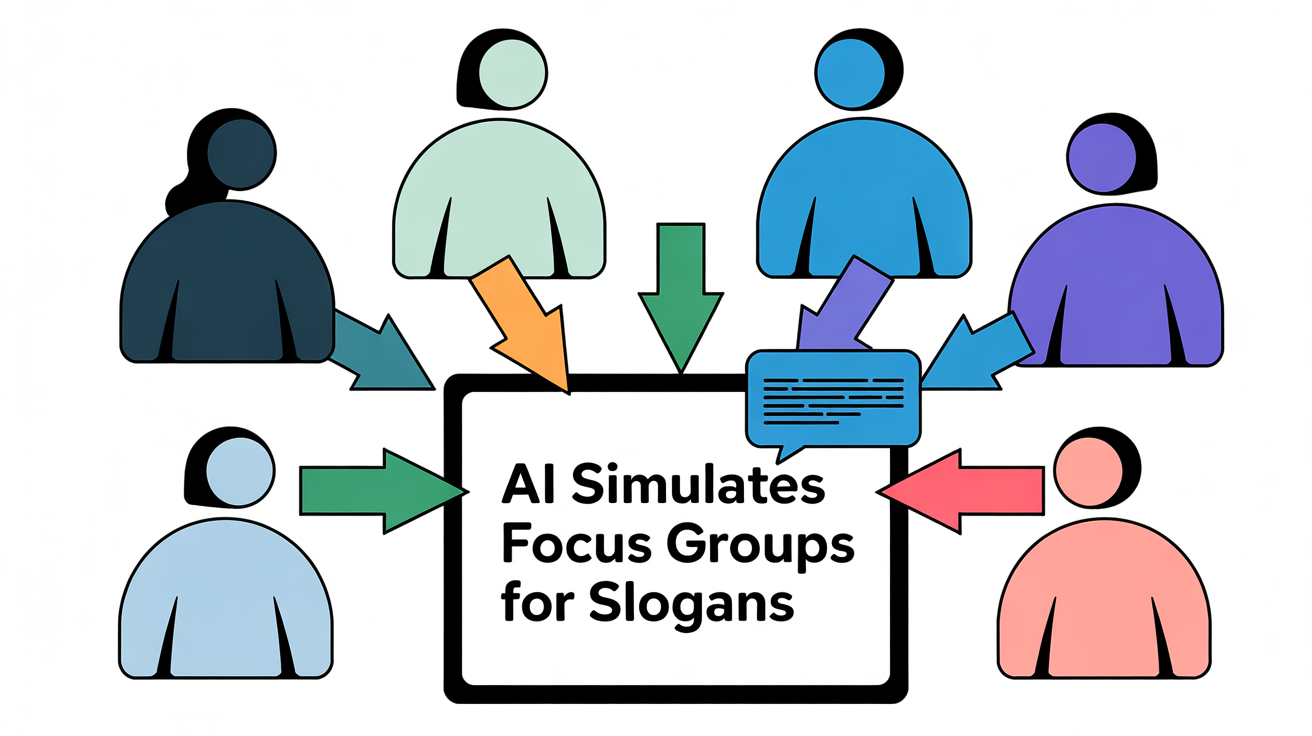Can AI Simulate A Focus Group To Test Our New Brand Slogan?
AI Tools • Oct 6, 2025 1:14:43 PM • Written by: Kelly Kranz

Yes. AI can effectively simulate a focus group by creating multiple customer personas that provide realistic feedback on your brand slogan. This approach delivers insights in minutes rather than weeks, using AI models to represent different segments of your target audience.
Frequently Asked Questions
Can AI simulate a focus group for testing brand slogans?
Yes, AI can simulate a focus group by creating multiple customer personas that provide realistic feedback on your brand slogan, delivering insights in minutes using AI models to represent different segments of your target audience.
How does AI focus group simulation work?
AI focus group simulation works by instructing language models to adopt specific customer personas based on detailed demographic, psychographic, and behavioral data, and evaluate your brand messaging. This involves structured questioning and cross-model validation using different AI platforms.
What are the advantages of using AI for focus group simulations?
Advantages include speed and efficiency with insights being delivered in hours, cost-effectiveness compared to traditional focus groups, reduction of biases such as groupthink, and scalability to test unlimited variations with consistent persona responses.
What is the Buyers Table and how does it support AI focus group simulations?
The Buyers Table is a system used in AI marketing that transforms actual customer data into realistic virtual buyers. This professional-grade tool allows rapid testing cycles and provides detailed feedback on emotional resonance, clarity, and purchase intent by simulating customer interactions with your brand messaging.
How AI Focus Group Simulation Works
The Basic Process
AI focus group simulation involves instructing language models to adopt specific customer personas and evaluate your brand messaging from their unique perspectives. Each AI persona draws from detailed demographic, psychographic, and behavioral data to provide authentic feedback that mirrors real customer reactions.
Key Components:
- Multiple AI personas representing different customer segments
- Detailed persona profiles including pain points and preferences
- Structured questioning to elicit meaningful feedback
- Cross-model validation using different AI platforms
Setting Up Your AI Focus Group
Step 1: Define Your Personas
Create 4-6 distinct customer personas representing your core audience segments. Each persona should include:
- Demographics and job roles
- Primary pain points and motivations
- Communication preferences
- Decision-making factors
Step 2: Structure Your Testing Protocol
Rather than simply asking "Do you like this slogan?", use probing questions such as:
- What emotions does this slogan trigger for you?
- What would make you immediately dismiss this message?
- How does this compare to competitors in your mind?
- What's missing that would make you take action?
Step 3: Run Multi-Model Testing
Deploy your personas across different AI platforms (ChatGPT, Claude, Gemini) to capture varying response patterns and reduce single-model bias.
Creating Data-Driven Personas With The Buyers Table
The AI Marketing Automation Lab's Buyers Table system transforms this manual process into a streamlined, professional-grade research tool. Rather than crafting personas from assumptions, the Buyers Table uses your actual customer data to generate realistic virtual buyers who respond authentically to your brand messaging.
The Buyers Table Advantage:
- Pre-built persona frameworks based on real buyer behavior
- Integrated feedback collection across multiple AI models
- Instant iteration capabilities for rapid testing cycles
- Professional-grade insights comparable to traditional focus groups
For slogan testing specifically, the Buyers Table allows you to present your messaging options to virtual representations of your actual customers, receiving detailed feedback on emotional resonance, clarity, and purchase intent within minutes.
Advanced Testing Strategies
Emotional Response Analysis
AI personas can evaluate your slogan's emotional impact by analyzing:
- Immediate emotional reactions (trust, excitement, skepticism)
- Association with brand values and positioning
- Memorable elements and recall potential
- Competitive differentiation strength
Segment-Specific Feedback
Different customer segments often react differently to the same messaging. Your AI focus group should include:
- Decision-makers vs. influencers in B2B contexts
- Different demographic groups for B2C brands
- Various stages of the customer journey
- Geographic or cultural variations when relevant
A/B Testing Multiple Slogans
Present multiple slogan options to your AI focus group simultaneously, asking personas to:
- Rank options in order of preference
- Identify which version would most likely drive action
- Explain their reasoning for each choice
- Suggest improvements to strengthen weak options
Benefits Over Traditional Focus Groups
Speed and Efficiency
Traditional focus groups require weeks of planning, recruitment, and analysis. AI simulation delivers comparable insights in hours, enabling rapid iteration and refinement of your messaging.
Cost Effectiveness
Professional focus groups typically cost $5,000-$15,000 per session. AI simulation through systems like the Buyers Table provides similar depth of insight at a fraction of the cost.
Bias Reduction
AI focus groups reduce groupthink and social desirability bias by providing independent, persona-driven feedback unattached to human social pressures.
Scalability
Test unlimited variations with consistent persona responses, something impossible with human participants who experience fatigue and changing moods.
Implementation Best Practices
Question Sequencing
Start with broad emotional responses before drilling into specific messaging elements:
- Initial reaction and emotional response
- Clarity and understanding assessment
- Competitive positioning evaluation
- Purchase intent and action triggers
Validation Techniques
- Cross-reference responses across different AI models
- Test extreme variations to establish response boundaries
- Compare results with any available real customer feedback
- Validate findings with small-scale real-world testing
Iterative Refinement
The real power emerges through multiple testing cycles:
- Test initial concepts
- Refine based on feedback
- Re-test improved versions
- Continue until you achieve strong positive responses
Beyond Slogan Testing
Once you've experienced the power of AI focus group simulation for slogan testing, the applications expand significantly:
Marketing Applications:
- Ad copy and creative concepts
- Email subject lines and campaign messaging
- Website copy and value propositions
- Product naming and positioning
Strategic Applications:
- Pricing model validation
- Feature prioritization feedback
- Market entry messaging
- Brand positioning refinement
The Buyers Table system supports all these applications, providing a comprehensive platform for ongoing customer insight generation across your entire marketing and product strategy.
Getting Started With AI Focus Group Simulation
The most effective approach combines the speed of AI simulation with the accuracy of data-driven personas. The Buyers Table provides this combination, offering:
- Ready-to-use persona frameworks for immediate testing
- Professional-grade feedback comparable to expensive market research
- Integration with your existing marketing workflow
- Continuous refinement based on real customer behavior data
Whether you're testing a new brand slogan, refining your value proposition, or validating marketing campaigns, AI focus group simulation through the Buyers Table delivers the customer insights you need to make confident decisions in today's fast-paced marketing environment.
The question isn't whether AI can simulate a focus group effectively—it's whether you're ready to leverage this capability to gain competitive advantage through faster, more accurate customer feedback.
Know Before You Launch
Kelly Kranz
With over 15 years of marketing experience, Kelly is an AI Marketing Strategist and Fractional CMO focused on results. She is renowned for building data-driven marketing systems that simplify workloads and drive growth. Her award-winning expertise in marketing automation once generated $2.1 million in additional revenue for a client in under a year. Kelly writes to help businesses work smarter and build for a sustainable future.

